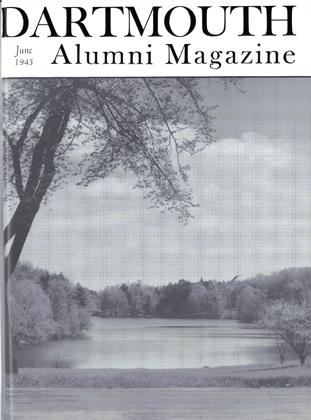THE DARTMOUTH UNDERGRADUATE CHAPTER of Americans United for World Organization in cooperation with other interested groups in Hanover has offered a full schedule of lectures, round-table discussions and debates on issues of world importance during the past two months.
Following a talk by the Rev. Bernard Iddings Bell on "What Has Religion Got to Do with Peace," which was given on April 14, President Hopkins, chairman of the national organization, spoke on April 21 on the background and development of Americans United and drew a parallel between the efforts made 25 years ago and today to found an international organization to preserve world peace.
The pros and cons of the Bretton Woods Monetary Proposals were debated on April 24 by Prof. James F. Cusick, Economics Department, and Latimer Gray, vice president and head of the foreign division of the First National Bank of Boston, with the affirmative side supported by Professor Cusick. The debate drew a standingroom-only audience.
A lecture on the "Changing Soviet Civilization" was given by Prof. Ernest J. Simmons, Cornell University Professor of Slavic Languages and Literatures and Director of Cornell's Summer School in Contemporary Russian Civilization, on May 8.
The second debate scheduled by the College chapter of Americans United, discussed the "Pacific Islands and Other Colonial Problems" with Dr. Wing-tsit Chan, Lecturer on Chinese Civilization, and Major James J. O. Anderson, Officer in Charge of the Marine Detachment at Dartmouth and a former military governor of one of the Pacific Islands, taking part. Lewis Mumford, on May 24, brought the series to its climax with a public lecture on the San Francisco Conference. The round-table discussions, where no punches were pulled by speakers or audiences, started off on April 18 with a question and answer evening on the Dumbarton Oaks proposals with four Dartmouth faculty members supplying the answers. They were Professors Gazley and Hill of the History Department, Professor Pelenyi of the Government Department, and Professor Von Mohrenschildt of the Russian Civilization course. The second round table discussion on May 2 talked over "What to Do With a Defeated Germany."
 View Full Issue
View Full Issue
More From This Issue
-
 Article
ArticleDARTMOUTH'S RIVER
June 1945 By Alice Pollard -
 Article
ArticleLaureled Sons of Dartmouth
June 1945 By H. F. W. -
 Article
ArticleFOR MILITARY TRAINING
June 1945 -
 Class Notes
Class Notes1918
June 1945 By ERNEST H. EARLEY, DONALD L. BARR -
 Class Notes
Class Notes1945
June 1945 By ARTHUR NICHOLS -
 Class Notes
Class Notes1908
June 1945 By LAURENCE SYMMES, WILLIAM D KNIGHT, ARTHUR BARNES
Article
-
 Article
ArticleMINIMUM POINT .RULING AFFECTS ALL CLASSES
March, 1926 -
 Article
ArticleCLASS OF '86 WINS THE CUP
August, 1926 -
 Article
ArticleAirport Boost
MARCH 1959 -
 Article
ArticleHonoring a 17 with the Vaughan Recital Series
MARCH 1989 -
 Article
ArticleFOR OLD BOOKS NEW DUST JACKETS
MARCH 1990 -
 Article
ArticleMATERIES MEDICI
June 1924 By Edwin J. Bartlett '72

